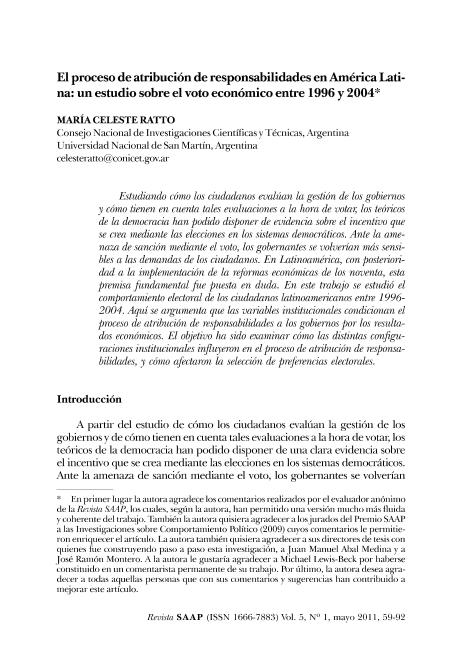Mostrar el registro sencillo del ítem
dc.contributor.author
Ratto, Maria Celeste

dc.date.available
2023-03-31T16:19:36Z
dc.date.issued
2011-05
dc.identifier.citation
Ratto, Maria Celeste; El proceso de atribución de responsabilidades en América Latina: Un estudio sobre el voto económico entre 1996 y 2004; Sociedad Argentina de Análisis Político; Revista S.A.A.P; 5; 1; 5-2011; 59-92
dc.identifier.issn
1666-7883
dc.identifier.uri
http://hdl.handle.net/11336/192330
dc.description.abstract
Estudiando cómo los ciudadanos evalúan la gestión de los gobiernos y cómo tienen en cuenta tales evaluaciones a la hora de votar, los teóricos de la democracia han podido disponer de evidencia sobre el incentivo que se crea mediante las elecciones en los sistemas democráticos. Ante la amenaza de sanción mediante el voto, los gobernantes se volverían más sensibles a las demandas de los ciudadanos. En Latinoamérica, con posterioridad a la implementación de la reformas económicas de los noventa, esta premisa fundamental fue puesta en duda. En este trabajo se estudió el comportamiento electoral de los ciudadanos latinoamericanos entre 1996- 2004. Aquí se argumenta que las variables institucionales condicionan el proceso de atribución de responsabilidades a los gobiernos por los resultados económicos. El objetivo ha sido examinar cómo las distintas configuraciones institucionales influyeron en el proceso de atribución de responsabilidades, y cómo afectaron la selección de preferencias electorales.
dc.description.abstract
Numerous economic reforms were implemented in many Latin American countries during the 1990s. The consequences of these reforms were: increases in unemployment and poverty, and stagnation of the social budget. In face of these negative results, the emergence of strong opposition from the citizens and the punishment at the polls of those politicians which had implemented such reforms, were predicted. Oddly enough, many of the presidents who implemented the reforms were reelected. What are the factors that account for the paradoxical electoral behavior of the voters? This article argues that institutional variables condition the process of accountability. Some political factors tend to affect the clarity in the process of responsibilities attributed to the government for economic outcomes. Political factors shape the electoral consequences of economic performance. It studies how different institutional designs have affected the attribution of governmentks responsibility for economic outcomes in Latin American countries in 1996, 2000 and 2004.
dc.format
application/pdf
dc.language.iso
spa
dc.publisher
Sociedad Argentina de Análisis Político

dc.rights
info:eu-repo/semantics/openAccess
dc.rights.uri
https://creativecommons.org/licenses/by-nc-sa/2.5/ar/
dc.subject
COMPORTAMIENTO
dc.subject
ELECTORAL
dc.subject
VOTO
dc.subject
ECONÓMICO
dc.subject.classification
Ciencia Política

dc.subject.classification
Ciencia Política

dc.subject.classification
CIENCIAS SOCIALES

dc.title
El proceso de atribución de responsabilidades en América Latina: Un estudio sobre el voto económico entre 1996 y 2004
dc.type
info:eu-repo/semantics/article
dc.type
info:ar-repo/semantics/artículo
dc.type
info:eu-repo/semantics/publishedVersion
dc.date.updated
2023-03-30T14:47:46Z
dc.journal.volume
5
dc.journal.number
1
dc.journal.pagination
59-92
dc.journal.pais
Argentina

dc.journal.ciudad
Buenos Aires
dc.description.fil
Fil: Ratto, Maria Celeste. Consejo Nacional de Investigaciones Científicas y Técnicas; Argentina. Universidad Nacional de San Martín; Argentina
dc.journal.title
Revista S.A.A.P

dc.relation.alternativeid
info:eu-repo/semantics/altIdentifier/url/https://revista.saap.org.ar/articulos/revista-saap-volumen-5-1.html
dc.relation.alternativeid
info:eu-repo/semantics/altIdentifier/url/https://revista.saap.org.ar/contenido/revista-saap-v5-n1/Ratto.pdf
Archivos asociados
